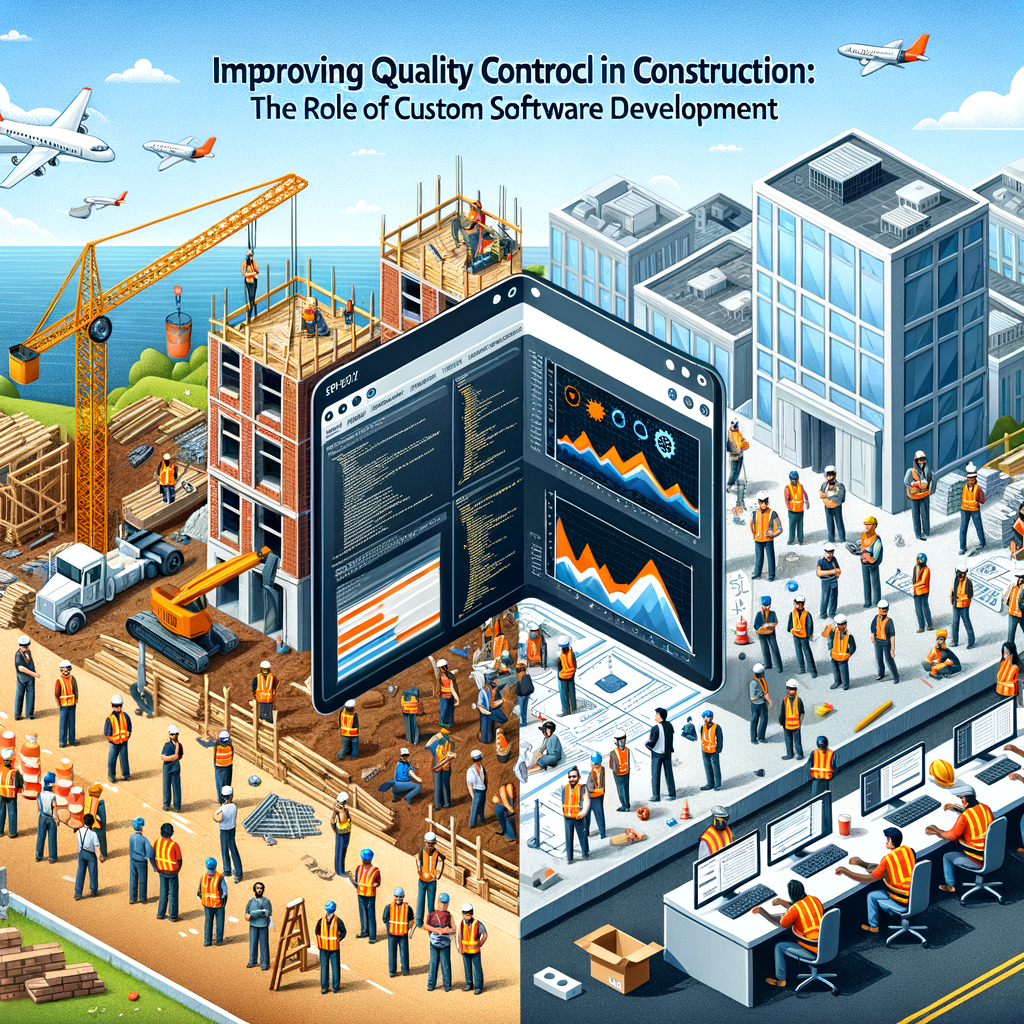Quality control is one of the most critical aspects of the construction industry. Ensuring that every project meets regulatory standards, safety protocols, and client expectations is essential for success.
However, traditional methods of quality control often involve manual processes, complicated workflows, and a lack of transparency.
As a result, construction companies are turning to custom-built quality control software. And streamline operations, improve compliance, and ensure project quality.
In this blog, we’ll explore how custom software development can revolutionize quality control in the construction sector. And ensuring projects not only meet but exceed industry standards.
The Importance of Quality Control in Construction
Quality control (QC) in construction refers to the procedures & processes that ensure a project is completed. And according to the defined standards, specifications, and requirements.
It involves everything from ensuring materials meet quality standards to verifying that construction techniques are followed correctly. And the final project aligns with its original design.
Quality control ensures:
– Compliance with local, national, and international building regulations.
– Safety for workers and future occupants.
– Durability and longevity of the construction project.
– Client satisfaction by delivering a project that meets or exceeds expectations.
Without robust quality control measures, projects risk delays, cost overruns, safety hazards, and even potential legal issues.
Challenges in Traditional Quality Control
Many construction companies still rely on manual quality control processes, which often lead to inefficiencies and errors. Some of the common challenges include:
1. Inconsistent Inspections:
Manual inspections can be inconsistent, leading to overlooked issues or non-compliance with safety and quality standards.
2. Lack of Real-Time Data:
Traditional processes often rely on paper documentation or spreadsheets, which offer no real-time tracking of quality issues.
3. Fragmented Communication:
Quality control involves multiple stakeholders—engineers, contractors, site managers, and more—leading to fragmented communication and delays in addressing issues.
4. Difficulty in Tracking Compliance:
Keeping up with regulatory compliance is a challenge, especially in large projects that involve various codes, standards, and certifications.
5. Inefficient Documentation:
Managing heaps of paperwork can lead to errors, missing data, and difficulty in creating audit trails.
These challenges demonstrate the need for a more efficient, accurate, and transparent approach to quality control. One that can be achieved through custom software development.
How Custom Quality Control Software Enhances Projects
Custom-built quality control software can address the limitations of traditional methods. Like by automating processes, improving data accuracy, and enabling real-time monitoring of project quality. Here’s how such solutions can transform your quality control efforts:
1. Standardizing Quality Inspections
One of the key benefits of custom software is its ability to standardize inspections across all your construction sites. With customizable checklists and automated workflows, you can ensure that every aspect of the project is inspected consistently. And also reducing the likelihood of errors or missed steps.
For example, you can create custom inspection templates for different phases of a project (e.g., foundation, framing, electrical). These templates ensure that every inspector follows the same process. And making it easier to maintain high-quality standards and meet compliance requirements.
2. Real-Time Data Collection and Reporting
Custom software enables real-time data collection from the construction site. With mobile apps integrated into your quality control system, site inspectors can log their findings immediately. Ans attach photos, and submit reports in real time. This eliminates delays in reporting and allows project managers to address any quality issues as they arise.
Additionally, real-time reporting ensures that all stakeholders—whether on-site or off-site—have access to the latest data. Improving collaboration and decision-making.
3. Tracking Compliance and Certifications
Custom-built quality control software can automate the tracking of compliance with local, national, and international construction standards. Such as ISO 9001 or OSHA regulations. The system can alert you when certifications expire or when inspections are due, reducing the risk of non-compliance.
By integrating with existing databases, the software can also help you verify that materials and construction methods meet all relevant standards. Ensuring your project does not face costly delays or legal penalties due to compliance issues.
4. Improved Communication and Collaboration
Construction projects require collaboration across multiple teams, from architects and engineers to contractors and site managers. Custom software can centralize communication, allowing team members to share updates, inspection reports, and compliance certificates in one platform. This eliminates the need for fragmented communication methods like email and phone calls, which can lead to miscommunication and delays.
With better communication, your team can resolve quality issues faster, prevent rework, and ensure smoother project completion.
5. Historical Data and Analytics
One of the most powerful features of custom quality control software is its ability to store historical data. Over time, the system will collect a vast amount of data from inspections, audits, and reports. This data can be analyzed to identify trends, recurring quality issues, and areas for improvement.
For example : if you notice that certain materials consistently fail inspection, you can use this data to make more informed decisions about suppliers or adjust project specifications. By leveraging data analytics, you can continuously improve the quality of your construction projects and reduce costly mistakes.
The Role of Custom Software in Ensuring Project Quality
Custom software development allows you to build a solution tailored specifically to your construction company’s needs. Unlike off-the-shelf solutions, which require you to adapt your processes to the software, a custom solution is designed to fit your existing workflows. Making the transition seamless and intuitive for your team.
Key Benefits of Custom Quality Control Software:
– Tailored to Your Needs:
A custom solution can be designed to address the specific challenges you face, such as compliance tracking, multi-site management, or specialized inspection needs.
– Scalability:
Custom software is scalable and can grow with your business, handling larger projects and more complex regulatory requirements as needed.
– Integration with Existing Systems:
Custom software can integrate with your existing construction software development tools, ensuring a smooth workflow across project management, financials, and quality control.
– Enhanced Security:
A custom-built solution can offer enhanced security features to protect sensitive project data, ensuring compliance with data protection regulations.
Real-World Example: Custom Quality Control Software in Action
Consider a large-scale construction company working on multiple projects across different locations. Traditionally, they struggled with inconsistent inspections, delayed reporting, and fragmented communication among teams. After implementing a custom-built quality control system, they were able to:
– Standardize inspections across all sites, leading to a 20% reduction in quality issues.
– Improve real-time reporting, reducing delays in addressing defects.
– Track compliance more efficiently, avoiding costly penalties.
– Use data analytics to identify and resolve recurring quality issues, improving overall project quality.
With these improvements, the company saw a significant boost in both project efficiency and client satisfaction.
Conclusion: The Future of Quality Control in Construction
In today’s fast-paced construction environment, ensuring quality control is essential for project success. Custom-built quality control software offers a solution that addresses the limitations of traditional methods.
Allowing companies to standardize inspections, track compliance, and improve communication across teams.
As the construction industry continues to evolve, adopting custom software solutions will be key. To staying competitive and delivering projects that meet the highest quality standards. Explore and learn more about how custom software development company can improve your construction processes.
By embracing custom solutions, you can ensure that your construction projects are not only compliant. But also built to last, enhancing both safety and client satisfaction.






More Stories
Why Business Needs Mobile App Development Services in USA?
Remote Full Stack Developers in Dublin
How Azure Cloud is the Future of AI & ML